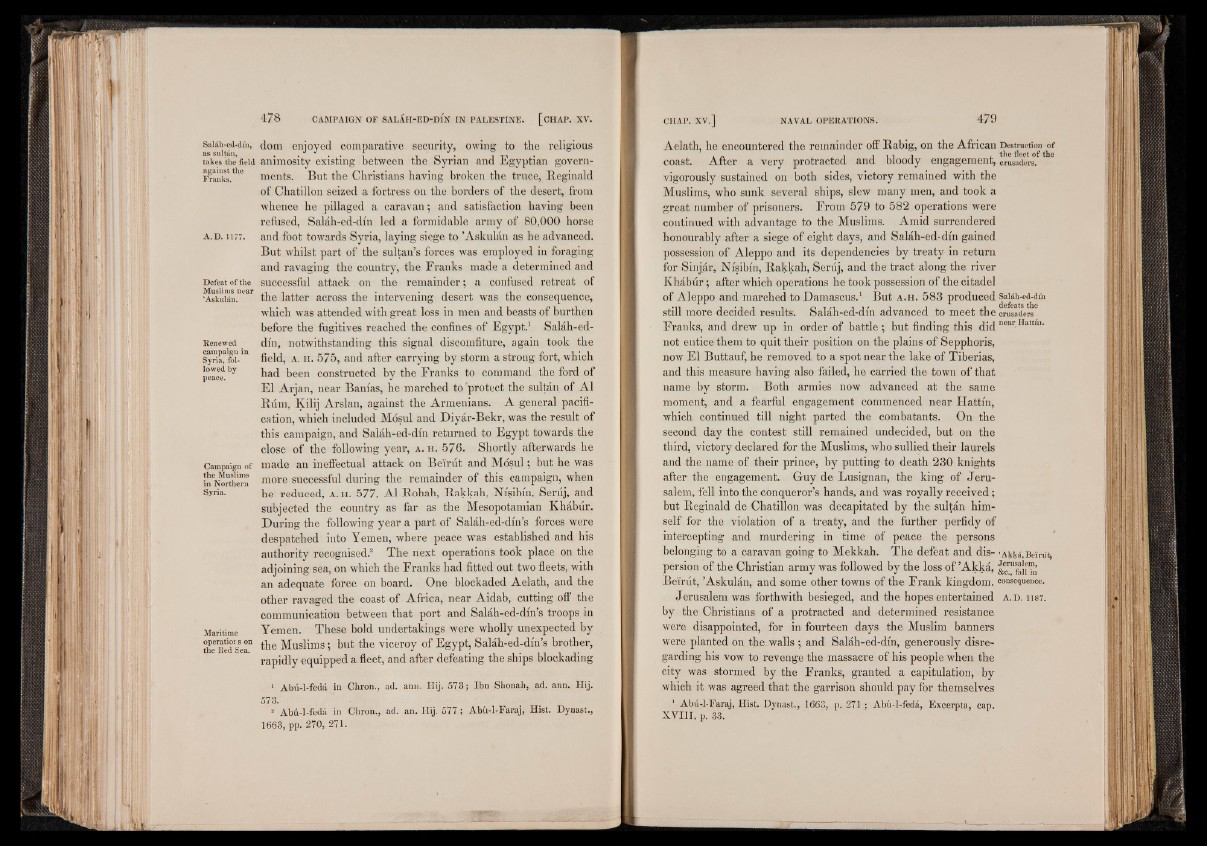
Saláh-ed-dín,
as sultán,
takes the field
against the
Franks.
A.D. 1177.
Defeat of the
Muslims near
’Askulán.
Renewed
campaign in
Syria, followed
by
peace.
Campaign of
the Muslims
in Northern
Syria.
Maritime
operations on
the Red Sea.
dom enjoyed comparative security, owing to the religious
animosity existing between the Syrian and Egyptian governments.
But the Christians having broken the truce, Reginald
of Chatillon seized a fortress on the borders of the desert, from
whence he pillaged a caravan; and satisfaction having been
refused, Saláh-ed-dín led a formidable army of 80,000 horse
and foot towards Syria, laying siege to ’Askulán as he advanced.
But whilst part of the sultan’s forces was employed in foraging
and ravaging the country, the Franks made a determined and
successful attack on the remainder; a confused retreat of
the latter across the intervening desert was the consequence,
which was attended with great loss in men and beasts of burthen
before the fugitives reached the confines of Egypt.1 Saláh-ed-
dín, notwithstanding this signal discomfiture, again took the
field, A. H. 575, and after carrying by storm a strong fort, which
had been constructed by the Franks to command the ford of
El Arjan, near Banias, he marched to protect the sultán of A1
Rum, Kilij Arslan, against the Armenians. A general pacification,
which included Mosul and Diyár-Bekr, was the result of
this campaign, and Saláh-ed-dín returned to Egypt towards the
close of the following year, a . h . 576. Shortly afterwards he
made an ineffectual attack on Beirut and Mosul; but he was
more successful during the remainder of this campaign, when
he reduced, a . h . 577, A1 Rohah, Rakkah, Nisi bin, Serúj, and
subjected the country as far as the Mesopotamian Iíhábúr.
During the following year a part of Saláh-ed-dín’s forces were
despatched into Yemen, where peace was established and his
authority recognised.2 The next operations took place on the
adjoining sea, on which the Franks had fitted out two fleets, with
an adequate force on board. One blockaded Aelath, and the
other ravaged the coast of Africa, near Aidab, cutting off the
communication between that port and Saláh-ed-dín’s troops in
Yemen. These bold undertakings were wholly unexpected by
the Muslims; but the viceroy of Egypt, Saláh-ed-dín’s brother,
rapidly equipped a fleet, and after defeating the ships blockading
1 Abú-1-fedá in Chron., ad. an». HijS 573; Ibn Shonah, ad. ann. Hij.
573.
2 Abú-1-fedá in Chron., ad. an. Hij. 577; Abíi-1-Faraj, Hist. Dynast.,
1663, pp. 270, 271.
Aelath, he encountered the remainder off Rabig, on the African Destruction of
coast. After a very protracted and bloody engagement, crusaders,
vigorously sustained on both sides, victory remained with the
Muslims, who sunk several ships, slew many men, and took a
great number of prisoners. From 579 to 582 operations were
continued with advantage to the Muslims. Amid surrendered
honourably after a siege of eight days, and Saláh-ed-dín gained
possession of Aleppo and its dependencies by treaty in return
for Sinjár, Nísibín, Rakkah, Serúj, and the tract along the river
Khábúr; after which operations he took possession of the citadel
of Aleppo and marched to Damascus.1 But a . h . 583 produced Saláh-ed-dín
still more decided results. Saláh-ed-dín advanced to meet the crusaders
Franks, and drew up in order of battle ; but finding this did near.Hattm-
not entice them to quit their position on the plains of Sepphoris,
now El Buttauf, he removed to a spot near the lake of Tiberias,
and this measure having also failed, he carried the town of that
name by storm. Both armies now advanced at the same
moment, and a fearful engagement commenced near Hattin,
which continued till night parted the combatants. On the
second day the contest still remained undecided, but on the
third, victory declared for the Muslims, who sullied their laurels
and the name of their prince, by putting to death 230 knights
after the engagement. Guy de Lusignan, the king of Jerusalem,
fell into the conqueror’s hands, and was royally received;
but Reginald de Chatillon was decapitated by the sultán himself
for the violation of a treaty, and the further perfidy of
intercepting and murdering in time of peace the persons
belonging to a caravan going to Mekkah. The defeat and dis- >Akká, Beirut,
persion of the Christian army was followed by the loss of ’Akká, ¿c^aliTú
Beirut, ’Askulán, and some other towns of the Frank kingdom, consequence.
Jerusalem was forthwith besieged, and the hopes entertained a . d . h s 7.
by the Christians of a protracted and determined resistance
were disappointed, for in fourteen days the Muslim banners
were planted on the walls ; and Saláh-ed-dín, generously disregarding
his vow to revenge the massacre of his people when the
city was stormed by the Franks, granted a capitulation, by
which it was agreed that the garrison should pay for themselves
1 Abú-1-Faraj, Hist. Dynast., 1663, p. 271 ; Abú-1-fedá, Excerpta, cap.
X V I I I . p. 33.